Creators Wanted Campaign Helps Solve the Workforce Crisis
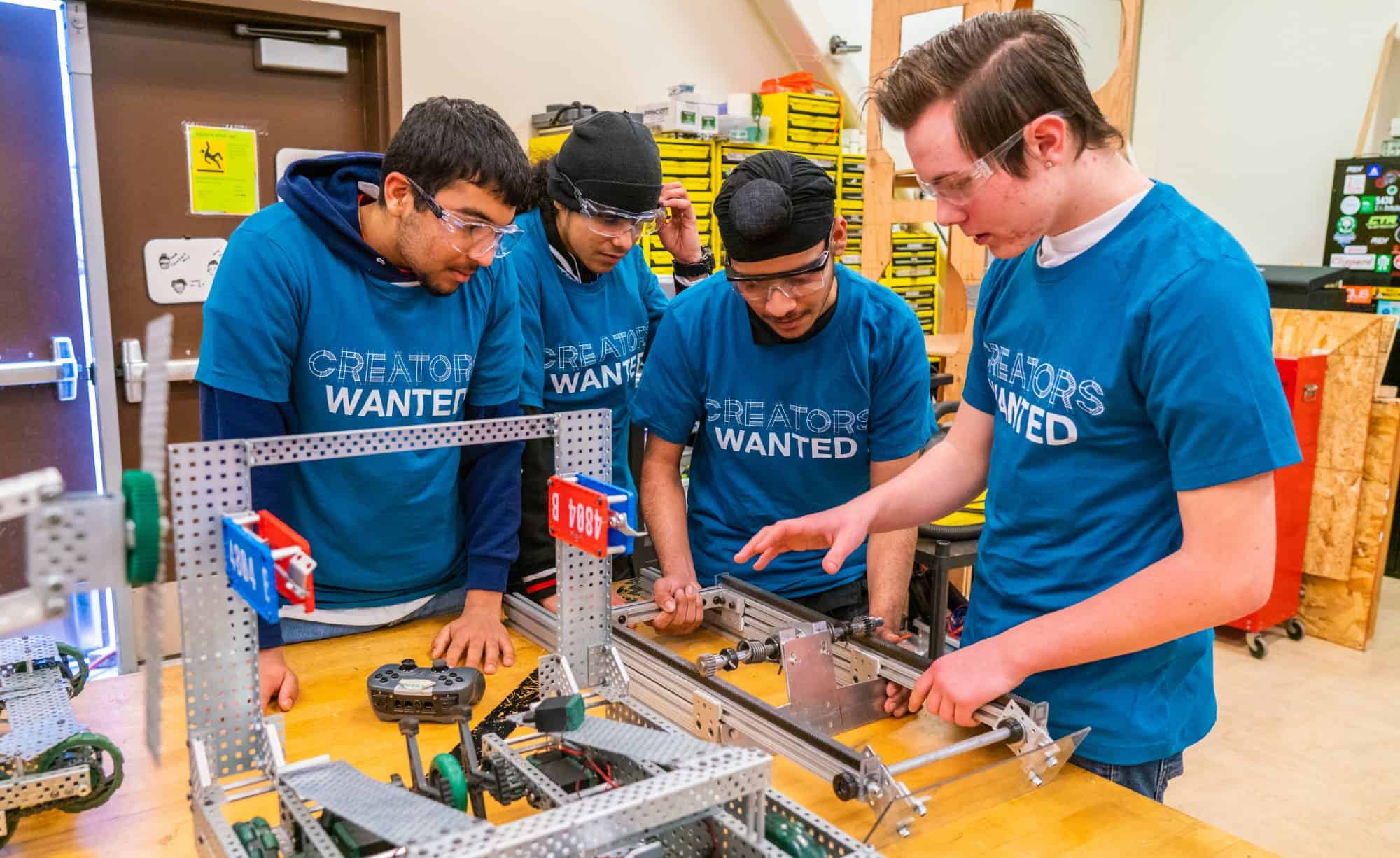
The National Association of Manufacturers and The Manufacturing Institute, the workforce and education partner of the NAM, are embarking together on an ambitious mission to reshape the public’s perception of manufacturing. NAM Vice President of Brand Strategy Chrys Kefalas explains what the groundbreaking Creators Wanted campaign is about and how people can get involved.
What is the Creators Wanted campaign?
We know Generation Z and Millennials want authenticity and real experiences that speak to their values and aspirations. Modern manufacturing provides the chance to create the future, to be true to who you are and who you want to be. But emerging workers aren’t flocking to our careers or even to apprenticeships and educational pathways. We have a massive perception problem, and it’s exacerbating a workforce crisis.
Creators Wanted is an on-the-ground tour coming to at least 20 states in 2020, as well as a long-term campaign to get more emerging workers across the country to look at manufacturing careers as prizes to be had and not as consolation prizes. We’re taking a mobile manufacturing experience into communities so that people can see and experience for themselves how humans and exciting technology such as AI and 5G are coming together to make great careers and a better future. Creators Wanted is about building connections for people so they can become manufacturers, grow in their careers and even advocate for the industry. And it’s about scaling up bold workforce programs at the Institute to add more veterans, women, diverse communities and youth to manufacturers’ talent pipeline.
What will the campaign achieve?
Ultimately, our goal with Creators Wanted is to reshape how most Americans view modern manufacturing careers. More immediately, by 2025, Creators Wanted aims to reduce the skills gap in the United States by 600,000, increase the number of students enrolling in technical and vocational schools or reskilling programs by 25% and increase the positive perception of the industry among parents to 50% from 27%.
Why should students consider a career in manufacturing?
First, we have plenty of opportunity. About half a million jobs are open today, and by 2028, we’ll need to fill 4.6 million jobs. Second, modern manufacturing jobs pay well and are incredibly rewarding. Manufacturing jobs regularly pay more than $80,000 and provide the opportunity to climb much higher in your career, all without incurring massive college debt. You can be a part of teams that are doing exciting work and have a job with a clear purpose, where you know your contribution makes a difference.
How can I get involved in Creators Wanted?
Right now, we’re prioritizing fundraising for the campaign so we can get the Creators Wanted Tour to as many communities as possible and expand our workforce programs for veterans, women, diverse communities and youth. If you believe that America needs this campaign and needs to renew the promise of careers in manufacturing, we hope you’ll consider chipping in and supporting.
To learn more about getting involved, go to CreatorsWanted.org.
Manufacturing Day Results Are In
Led by The Manufacturing Institute, the National Association of Manufacturers’ workforce and education partner, Manufacturing Day shows students what a career in modern manufacturing looks like. Throughout October, manufacturers throughout the nation hosted more than 3,000 MFG Day events, and more than 325,000 students, teachers and parents participated.
Manufacturers continue to cite struggles with finding talent. To help solve the workforce crisis, manufacturers open their doors on MFG Day to showcase their facilities and the changing nature of jobs to help shift perceptions about the sector as a career.
On social media, the event accumulated a record-setting 200 million impressions and 163,000 engagements, including posts from influencers. The event also generated $1.1 million in earned media.
The Manufacturing Institute conducted a survey of attendees and hosts to help gauge the impact of MFG Day. Going into the events, 21.4 percent of students participating in an MFG Day event said they had no familiarity with manufacturing. But after attending an event, approximately 90 percent of participants said they were more familiar with manufacturing, and 72.4 percent said they now believed that manufacturing provides an interesting and rewarding career. Moreover, 63.2 percent were more inclined to tell friends, family members or others about manufacturing as a career, with half of the attendees suggesting that they were motivated themselves to pursue a career in manufacturing.
“The modern manufacturing industry simply isn’t the one our grandparents remember. The career opportunities it offers today are increasingly high-tech, high-pay and—as thousands of students and parents discover for themselves each MFG Day—pretty fun too,” said Carolyn Lee, executive director of The Manufacturing Institute. “This year’s MFG Day was another great success. I’m grateful to the many manufacturers, educational institutions and other partners across the continent who not only opened their doors but helped open minds as a result.”
FAME Program Puts Student on Road to Success
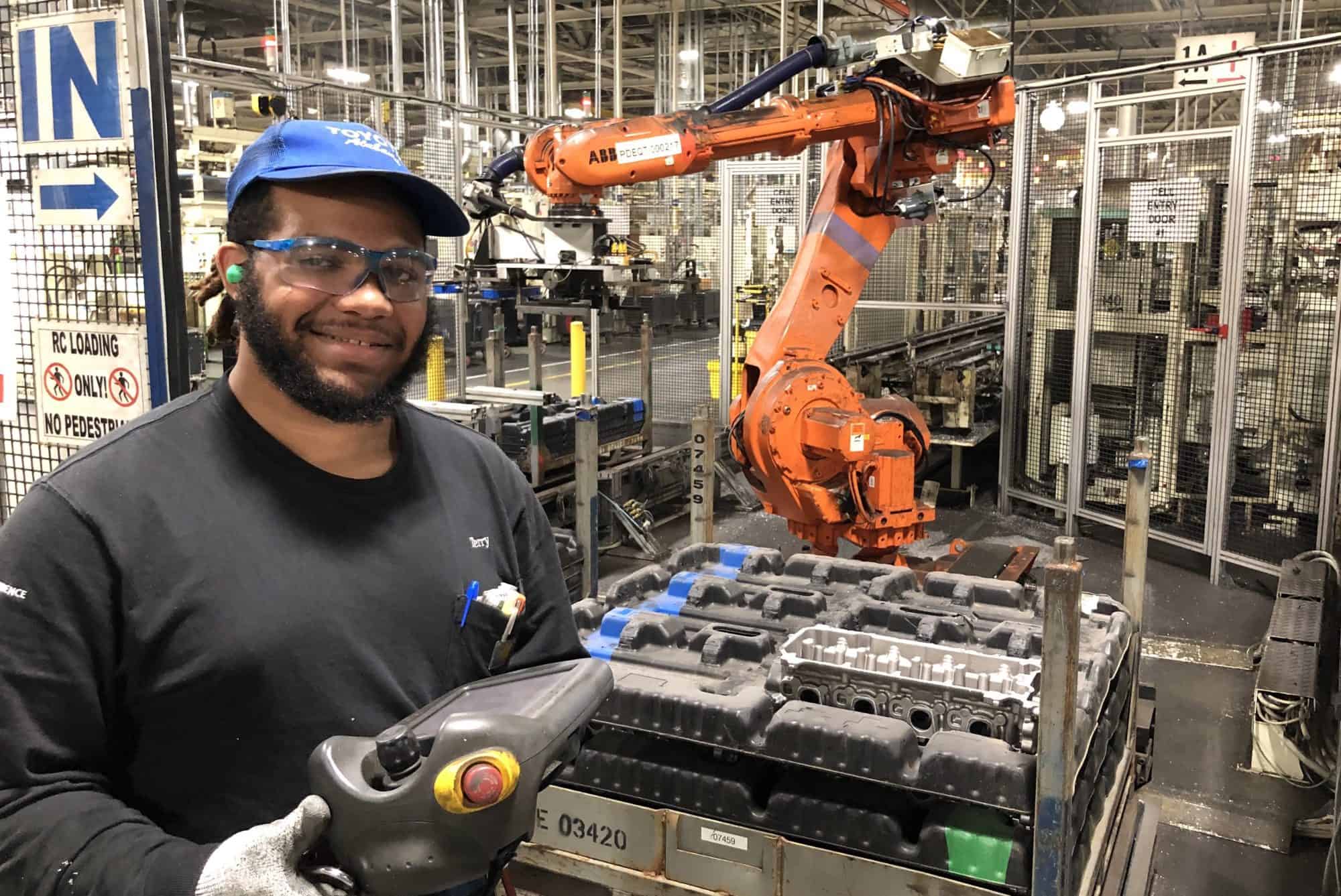
Terry McKelvey has always liked making things. Born in Huntsville, Alabama, he worked two part-time jobs in high school that showed him what modern manufacturing looked like. And when FAME program leaders visited the facility where he worked, he discovered the path to a full-time, long-term career.
The FAME program trains students of all ages and backgrounds, from recent high school graduates to experienced manufacturing employees looking to advance their careers. FAME is an earn-and-learn apprenticeship where students spend time in the classroom and on the shop floor. After two years, students graduate with an Advanced Manufacturing Technician degree and no student debt. Originally developed and refined by Toyota, stewardship of the FAME program has recently transitioned to The Manufacturing Institute, the workforce and education partner of the National Association of Manufacturers. FAME chapters are currently operating in 13 states with nearly 400 partner companies, and the Manufacturing Institute intends to further expand the program nationwide.
Today, McKelvey is in his fourth semester of the FAME program at Toyota’s Huntsville facility. He particularly enjoys the hands-on aspect of his work, and has appreciated the chance to gain insights from a wide range of mentors and coworkers, including former FAME program participants.
“As part of the program, we’re able to work with new mentors and new groups every semester—and that gives me the opportunity to learn so much more,” said McKelvey. “Hearing from a whole bunch of people instead of just one person in particular helps me branch out and understand different concepts.”
Those different concepts have expanded McKelvey’s appreciation for the manufacturing industry, offering him a broader view of the different types of available roles.
“Being in this program has showed me that there’s so much more to manufacturing,” said McKelvey. “It’s not just the production aspect. It’s not just shipping and handling. It gets much more in-depth. You can understand the machines you work with on an entirely different level –and you see new things every day.”
McKelvey encourages people considering the FAME program to embrace the new challenges and experiences the program exposes students to. He says that the experience pays off, and that program participants can count on their colleagues for support. In fact, the tight-knit community he has created with other people in his program have been one of the highlights for McKelvey.
“We’re pretty close,” said McKelvey. “We’re like a family. We help each other out. If someone misses a day, we’ll check in on them. We look out for each other.”
What sets FAME apart from other apprenticeship programs is that it teaches the skills and the culture of manufacturing. Students graduate with the tools to not just fill open jobs—but to be successful leaders in the manufacturing industry.
Learn more about the Manufacturing Institute’s FAME apprenticeship program.
Manufacturers Celebrate Veterans at Heroes MAKE America Event
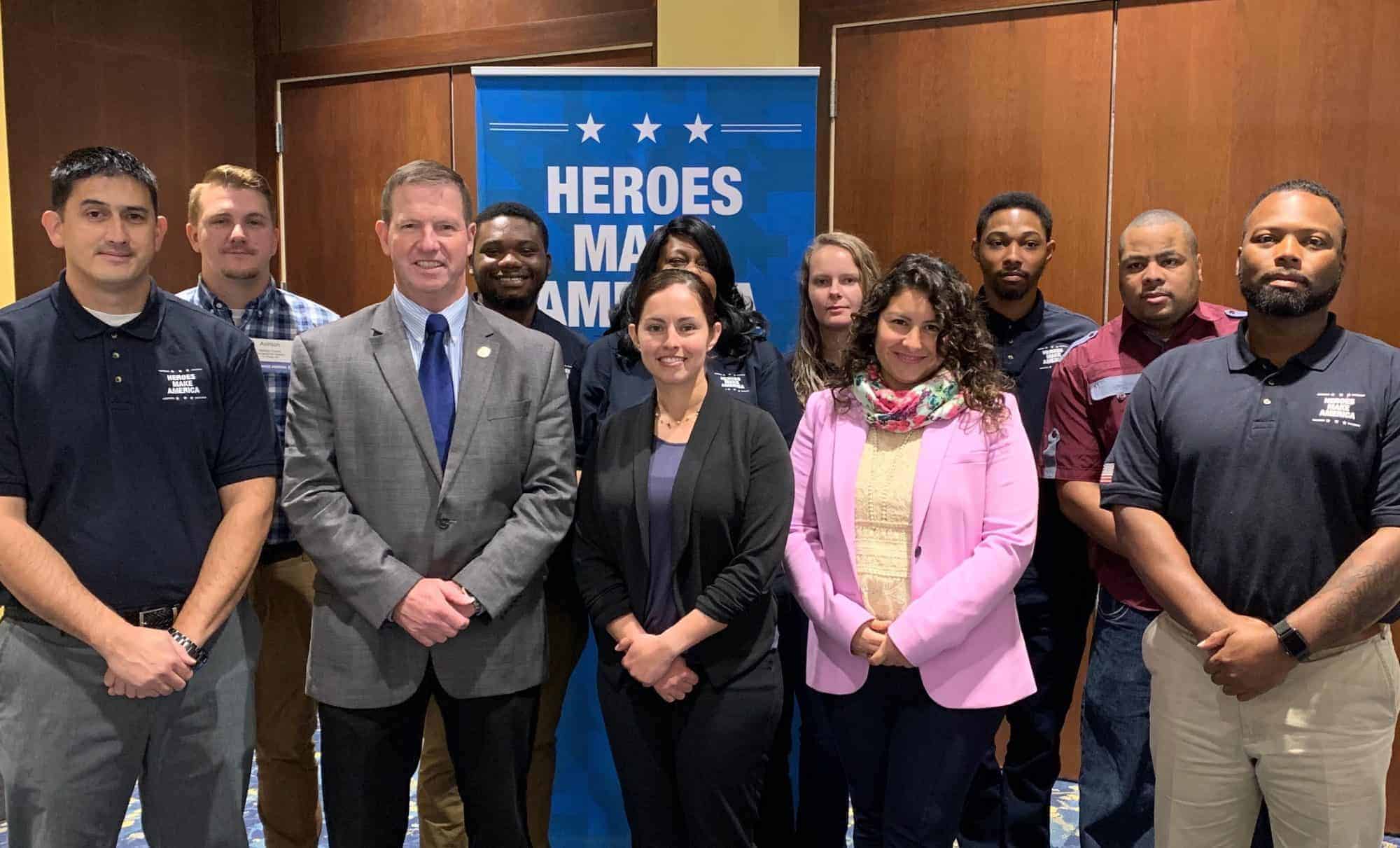
On Tuesday, North Carolina’s Fort Bragg was the site of an event to celebrate America’s veterans and to highlight opportunities available in manufacturing for transitioning service members and their families.
The event was presented by The Manufacturing Institute, the workforce and education partner of the National Association of Manufacturers. The program highlighted the Institute’s Heroes MAKE America program, which aims to build a mutually beneficial pipeline between the military and manufacturing. Major manufacturers like Samsung, Novelis and Ingersoll Rand and the Arconic Foundation have supported the program and continue to be partners in supporting veterans who are interested in the rewarding careers modern manufacturing offers.
“Heroes MAKE America helps transitioning service members develop a well-paying, interesting and productive career after they complete their service,” said Carolyn Lee, Executive Director of The Manufacturing Institute. “These individuals are in possession of the exact qualities and advanced skills that manufacturers seek, and the program prepares them be leaders in the industry.”
More than 200,000 men and women transition out of the military each year. There are about 500,000 jobs open in the manufacturing industry right now, and estimates suggest that manufacturers will need to fill 4.6 million jobs by 2028.
“The manufacturing industry presents an opportunity where specialized skills are utilized and workers contribute to projects that improve the world around them each and every day,” said Lee. “Heroes MAKE America connects transitioning service members to careers where they feel valued, inspired and where they can leverage the skills and training they developed in the military. Manufacturers that hire Heroes graduates also get workers with advanced specializations whose experiences make them prepared for new training and who show up on day one ready to lead and complete their new mission.”
The Heroes MAKE America program is growing rapidly, exploring new training options for 2020 and beginning to include participants from the National Guard as well as military spouses and fully separated veterans. The program is also planning to pilot online and hybrid models to encourage more participants who aren’t able to join full-time, diversifying its offerings and expanding its partnerships to include additional manufacturers and opportunities for veterans. So far this year, the program has graduated more than 125 individuals. More than half of all Heroes participants have over a decade of military service, and approximately one-quarter of Heroes graduates are in supervisory roles. The average salary of all graduates is nearly $70,000, with those in hourly roles making an average of $20 an hour.
The event’s program featured an informal reception, remarks by retired Army Sgt. Maj. Kenneth Preston and a panel of Heroes MAKE America graduates—including Joseph Smith, who has previously been profiled by the NAM.
FAME Program Gives Student Jumpstart in Auto Career
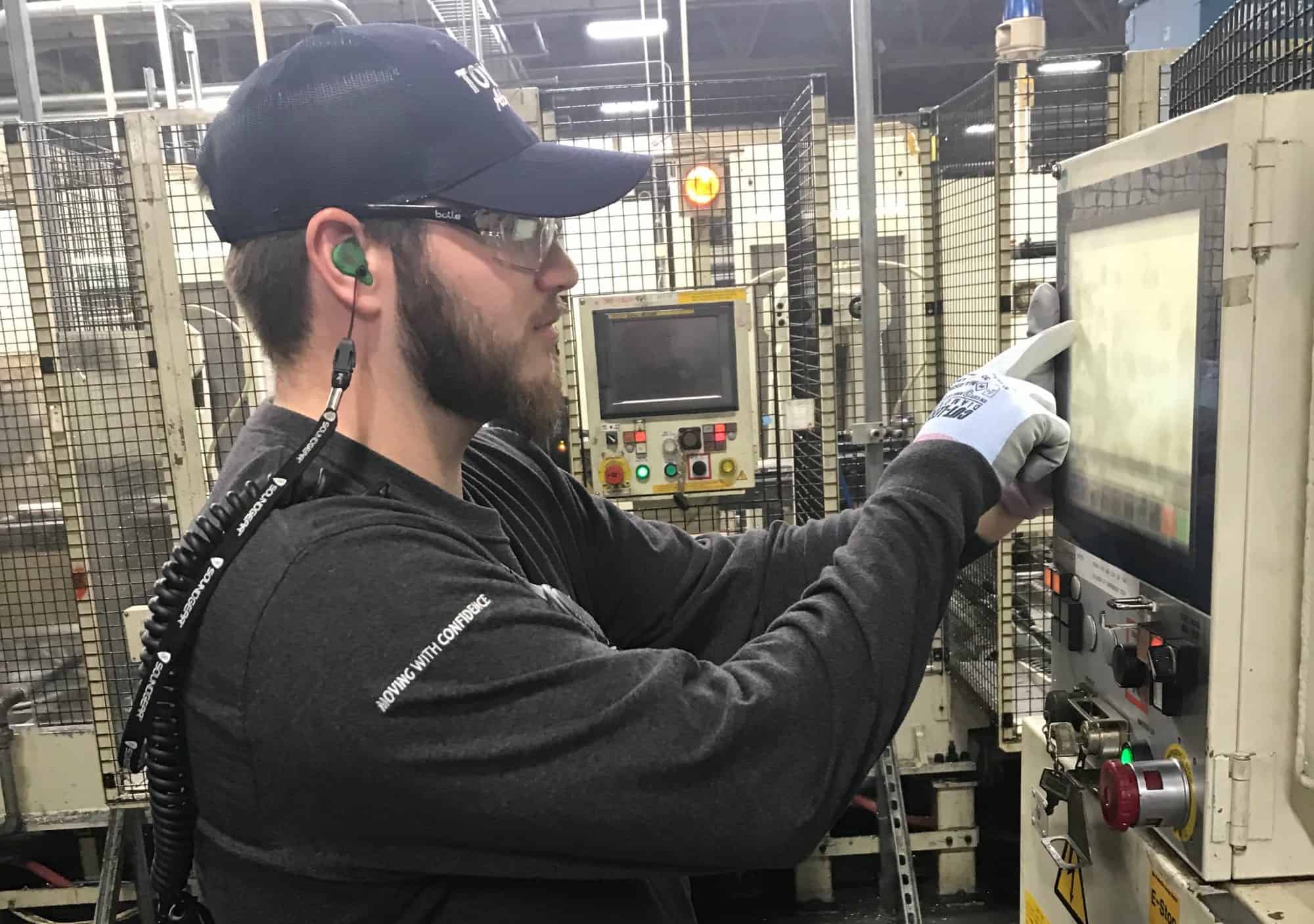
Austin Wilhite comes from a woodworking family. But even a few years ago, when he was a teen working in his uncle’s framing business, Austin Wilhite couldn’t have imagined that an apprenticeship program would lead him to a career in maintenance and manufacturing. Today, in his role as a Multicraft Maintenance Technician at Toyota Alabama, he’s excited about the opportunities he has unlocked.
“I always enjoyed building stuff and fixing things with my hands,” said Wilhite. “But I didn’t even know this career was a possibility.”
As a top student in his high school Agriculture Education class, he was encouraged by a teacher to attend a meeting about the Federation for Advanced Manufacturing Education (FAME). Originally developed and refined by Toyota, stewardship of the FAME program has recently transitioned to The Manufacturing Institute, the education and workforce partner of the National Association of Manufacturers.
FAME trains students of all ages and backgrounds, from recent high school graduates to experienced manufacturing employees looking to advance their careers. FAME is an earn-and-learn apprenticeship where students spend time in the classroom and on the shop floor. After two years, students graduate with an Advanced Manufacturing Technician degree and no student debt. FAME chapters are currently operating in 13 states, and the Manufacturing Institute intends to further expand the program nationwide.
“It was a really good program,” said Wilhite. “You go to work and you see the things you’re learning about in school, but then you also get to see the more advanced work you’re headed into. You can see the change—at the beginning, you’ve never been in a plant or seen any of this stuff. And then all of a sudden, you’re able to understand how to troubleshoot and fix machines the proper way.”
Three years after graduating from FAME, Wilhite is a testament to what graduates of this program can accomplish. His new career has opened financial doors for him; the money he earned during the FAME apprenticeship helped him replace his car so that he could get to and from work reliably. The year he graduated, he was able to purchase a new house, and a year later, he bought a new truck.
“I’m the only person I know who, at 20 years old, was able to buy a new house,” said Wilhite. “The program is a commitment, but I’ve been able to reward myself for making that commitment. Without the program, I definitely wouldn’t be where I am now.”
Wilhite is enthusiastic about his career prospects and proud of the new skills he has cultivated through the training he received in the FAME program.
“It’s a really good career,” said Wilhite. “Maintenance people are in really high demand. The program gives you the fundamentals of being able to work with your hands and fix things on your own. Plus, it’s a lot of problem-solving—and that’ll help you in your life.”
Learn more about the Manufacturing Institute’s FAME apprenticeship program.
Manufacturing Institute and Novelis Spotlight Industry Growth, Needs at MFG Day Event in Georgia
MFG Day Kicks Off a Month-Long Celebration of Manufacturing—Connecting with the Future Workforce to Fill Manufacturing Skills Gap
Washington, D.C. – The Manufacturing Institute, the education and workforce partner of the National Association of Manufacturers, and Novelis, the leading producer of flat-rolled aluminum products and the world’s largest recycler of aluminum, celebrated Manufacturing Day with a kick-off event at Novelis’ Greensboro, Georgia, facility. MFG Day gives students the opportunity to see what modern manufacturing looks like and aims to inspire them to pursue careers in the industry.
During the visit, Manufacturing Institute Executive Director Carolyn Lee and Novelis Senior Vice President and Chief Financial Officer and NAM board member Dev Ahuja met with students, business leaders and community members to discuss the high-tech, well-paying opportunities in modern manufacturing and the growing number of open jobs at manufacturing facilities across the country.
“Manufacturers across the country are looking for the best and brightest talent to join them,” said Lee. “Our industry is growing, but with that growth comes the challenge of recruiting and retaining new workers. Currently, there are more than half a million jobs open—an all-time high—and our industry will need to fill 4.6 million by 2028. Through MFG Day events, we have the chance to connect with the next generation of manufacturers and let them know—Creators Wanted.”
Lee and Ahuja were joined by 50 students from the local Greensboro area. The group was welcomed by Plant Manager Beatriz Landa, a leader within Novelis who recently transitioned to Greensboro following her assignment as Novelis’ Vice President of North America Specialties. Lee and Ahuja gave brief remarks before the group took a tour of the state-of-the-art aluminum recycling and casting facility.
“We are so proud to work alongside the National Association of Manufacturers and The Manufacturing Institute on such critical initiatives as Manufacturing Day, where we are able to highlight the innovative work being done by manufacturers here in Georgia and across the country—and open our doors to the communities where we live and work,” said Ahuja. “By focusing on attracting and retaining the best talent and making the right investments in training and developing our people, we are able to take full advantage of new technologies and processes—and help close the skills gap that is significantly impacting our industry.”
MFG Day is led by The Manufacturing Institute. First held in 2012 and organized by its founder—the Fabricators & Manufacturers Association, International—MFG Day gives manufacturers the opportunity to address the skills gap, connect with future generations, update the public perception of manufacturing and ensure the ongoing prosperity of the industry as a whole. Learn more about MFG Day and the significant impact this event has across the nation here.
Members of the media interested in covering the event should contact Leah Ferguson at [email protected]. To learn more about MFG Day, click here.
-MI-
The Manufacturing Institute is the education and workforce partner of the National Association of Manufacturers. It drives programs and research to promote modern manufacturing and jumpstart new approaches to growing manufacturing talent. For more information, please visit www.themanufacturinginstitute.org.
-Novelis-
Novelis Inc. is driven by its purpose to shape a sustainable world together. As a global leader in innovative products and services and the world’s largest recycler of aluminum, we partner with customers in the automotive, beverage can and specialties industries to deliver solutions that maximize the benefits of sustainable lightweight aluminum throughout North America, Europe, Asia and South America. The company is headquartered in Atlanta, Georgia, operates 23 facilities in 9 countries, has approximately 11,000 employees and recorded $12.3 billion in revenue for its 2019 fiscal year. Novelis is a subsidiary of Hindalco Industries Limited, an industry leader in aluminum and copper, and metals flagship company of the Aditya Birla Group, a multinational conglomerate based in Mumbai, India. For more information, visit novelis.com.
Manufacturing Institute, NAM and Samsung Seek Creators at MFG Day Event in South Carolina
MFG Day Kicks Off a Month-Long Celebration of Manufacturing—Connecting with the Future Workforce to Fill Manufacturing Skills Gap
Washington, D.C. – National Association of Manufacturers President and CEO Jay Timmons traveled to Newberry, South Carolina, today to kick off Manufacturing Day at a flagship event hosted by Samsung. MFG Day, spearheaded by The Manufacturing Institute, the education and workforce partner of the NAM, gives students the opportunity to peak behind the curtain and see what modern manufacturing looks like, aiming to inspire them to pursue careers in the industry.
Timmons joined South Carolina Gov. Henry McMaster and Samsung Executive Vice President and Head of Corporate Affairs David Steel at the Samsung Electronics Home Appliance facility—the company’s first home appliance manufacturing facility in the United States. The group met with students, business leaders and community influencers to discuss the high-tech, well-paying opportunities in modern manufacturing and the growing number of open jobs at manufacturing facilities across the country.
“Manufacturers across the country are seeking creators—those individuals who want to help solve tomorrow’s challenges today,” said Timmons. “Our industry is growing, and we need passionate, driven individuals to join our ranks. As the skills gap widens, 2.4 million positions across the manufacturing industry could go unfilled by 2028, so we must work to attract and develop new talent. Through MFG Day, we are engaging with the next generation of manufacturers—students—and letting them know our industry’s rallying cry: ‘Creators Wanted.’”
Timmons, Steel and Gov. McMaster were joined by students from Newberry Middle School. The group toured the state-of-the-art factory where Samsung manufacturers many of the home appliances sold in stores across the country. Following the tour, Timmons and Gov. McMaster gave brief remarks to the group, followed by a discussion with the head of human resources, Sherri Satterfield, about ways to inspire more students to pursue careers in modern manufacturing.
“We are proud to work with the National Association of Manufacturers and The Manufacturing Institute to engage students and help demonstrate the opportunities modern manufacturing has to offer,” said Steel. “There are more manufacturing jobs available in South Carolina than there are people to fill them. Opportunities for those seeking a rewarding, high-paying career in manufacturing truly abound.”
According to the latest data from the NAM, South Carolina manufacturers account for 17% of the state’s output, totaling $37.15 billion. In addition, the state has more than 247,000 manufacturing employees across 3,390 companies with an average compensation of more than $72,000.
MFG Day is led by The Manufacturing Institute. First held in 2012 and organized by its founder—the Fabricators & Manufacturers Association, International—MFG Day gives manufacturers the opportunity to address the skills gap, connect with future generations, update the public perception of manufacturing and ensure the ongoing prosperity of the industry as a whole. Learn more about MFG Day and the significant impact this event has across the nation here.
-MI-
The Manufacturing Institute is the education and workforce partner of the National Association of Manufacturers. It drives programs and research to promote modern manufacturing and jumpstart new approaches to growing manufacturing talent. For more information, please visit www.themanufacturinginstitute.org.
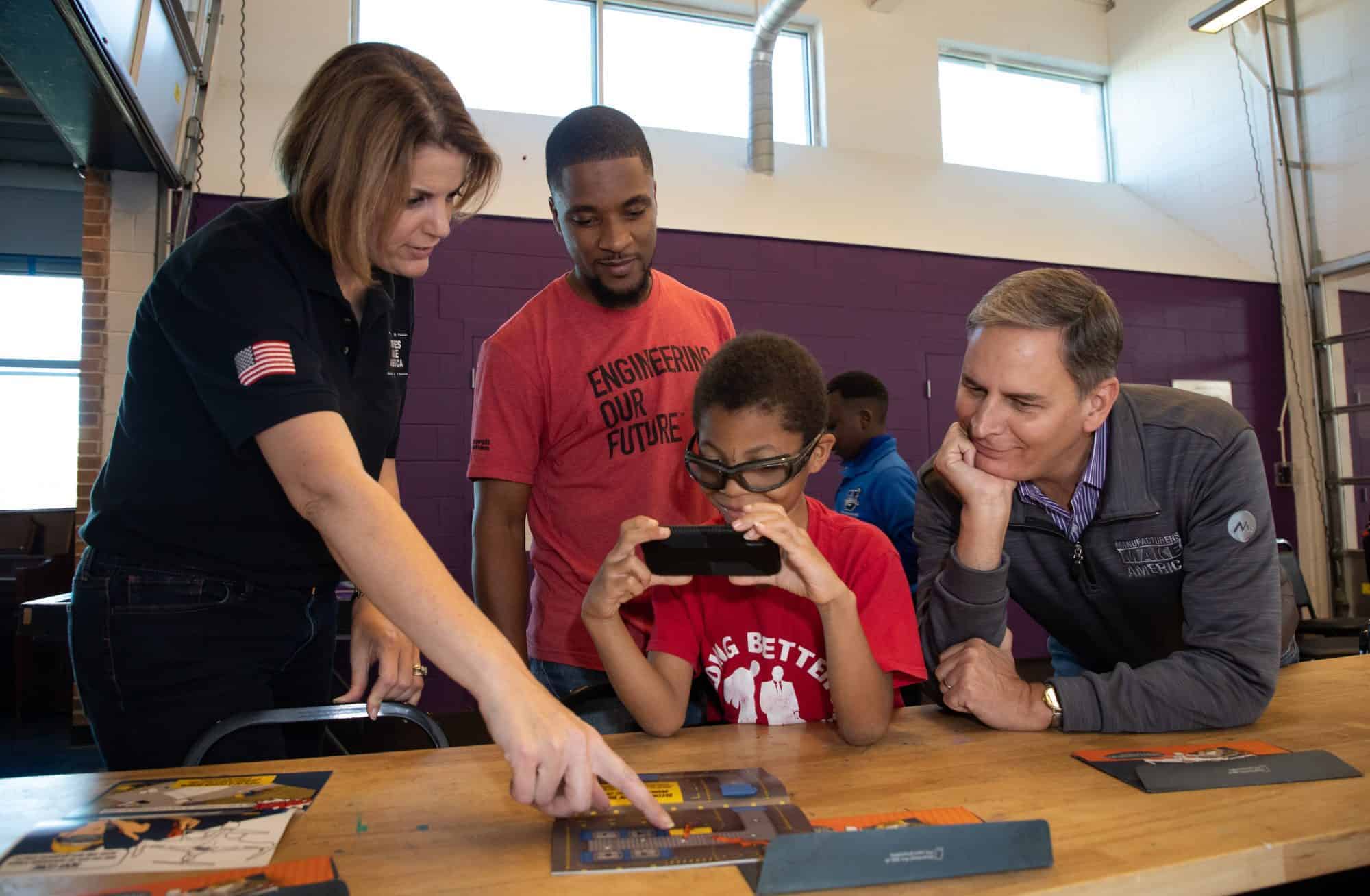
Today thousands of manufacturers and educational institutions across the country are opening their doors to students, parents, teachers and community leaders to celebrate Manufacturing Day. Led by The Manufacturing Institute, the National Association of Manufacturers’ workforce and education partner, Manufacturing Day shows students what a career in modern manufacturing looks like.
The Manufacturing Institute’s Executive Director Carolyn Lee will be in Greensboro, GA, at a Novelis facility.
#MFGDay19 is finally here! I’m headed to @Novelis in Greensboro, GA today. Can’t wait to show students what modern manufacturing looks like! https://t.co/OcDHgo0VYJ pic.twitter.com/efXtrG0Cbb
— Carolyn Lee (@cleeNAM) October 4, 2019
NAM’s President and CEO Jay Timmons will be joining a Manufacturing Day event at a Samsung facility in Newberry, SC.
In Newberry, SC, today to join @SamsungUS for their #MFGDay19 event! Going to be a great day showing students what a career in modern manufacturing can offer. Learn more: https://t.co/y4RjnAjie2 pic.twitter.com/e0m7oomFgk
— Jay Timmons (@JayTimmonsNAM) October 4, 2019
To keep up with the latest Manufacturing Day festivities, check out the MI and NAM on Twitter, plus the dedicated Manufacturing Day Twitter. Join the social media conversation by using the hashtag #MFGDay19 in related posts.
Manufacturing Institute, NAM Seek Creators Through Annual Manufacturing Day Celebrations
Washington, D.C. – The Manufacturing Institute, the education and workforce partner of the National Association of Manufacturers, kicked off a month-long celebration of modern manufacturing today on Manufacturing Day. Held annually on the first Friday in October, MFG Day helps show the reality of modern manufacturing careers in an industry that is vital to our economy. Today, thousands of companies and educational institutions around the nation will open their doors to students, parents, teachers and community leaders to showcase all that manufacturing has to offer.
“Our industry is growing and thriving, but we are facing a workforce crisis,” said NAM President and CEO Jay Timmons. “Over the next decade, manufacturers will create 4.6 million jobs—jobs that are high-skill, high-tech and high-paying—but 2.4 million could go unfilled if we don’t close the skills gap. MFG Day shines a spotlight on these opportunities and allows us to connect with the next generation of creators who will lead this industry into the future.”
Timmons will join South Carolina Gov. Henry McMaster and Samsung Executive Vice President and Head of Corporate Affairs David Steel, along with local students, business leaders and community influencers at Samsung Electronics Home Appliance facility in Newberry, South Carolina. Manufacturing Institute Executive Director Carolyn Lee will travel to Greensboro, Georgia, to visit Novelis and tour its state-of-the-art aluminum recycling center. Novelis Senior Vice President and Chief Financial Officer and NAM board member Dev Ahuja will join Lee.
“MFG Day aims to change the narrative around manufacturing. Many people have no sense of what modern manufacturing looks like in today’s economy. We want to connect with the future workforce—America’s students—and showcase the innovation and collaboration that drives manufacturing today,” said Lee. “MFG Day is an opportunity for anyone looking to join us on this exciting journey to get a firsthand look inside some of the country’s great manufacturing companies.”
First held in 2012 and organized by its founder—the Fabricators & Manufacturers Association, International—MFG Day gives manufacturers the opportunity to address the skills gap, connect with future generations, update the public perception of manufacturing and ensure the ongoing prosperity of the industry as a whole.
-MI-
The Manufacturing Institute is the education and workforce partner of the National Association of Manufacturers. It drives programs and research to promote modern manufacturing and jumpstart new approaches to growing manufacturing talent. For more information, please visit www.themanufacturinginstitute.org.
NAM Statement on Third Meeting of the American Workforce Policy Advisory Board
Washington, D.C. – National Association of Manufacturers President and CEO Jay Timmons released the following statement on the third meeting of the American Workforce Policy Advisory Board:
Today the American Workforce Policy Advisory Board released our initial recommendations, demonstrating that the board has already made significant progress. Manufacturers are proud to be a part of this effort as we build the workforce of tomorrow for our industry and across the American economy. With 4.6 million jobs to fill over the next decade, manufacturers in America are facing a workforce crisis—but it also presents us an opportunity to bring more people into high-paying careers if we connect them with the right training. Government, educators, community leaders and businesses all have a role to play and an obligation to help lead. That is why the NAM and The Manufacturing Institute this year launched Creators Wanted, an unprecedented campaign to inspire the next generation of manufacturing workers.
Background
The American Workforce Policy Advisory Board, chaired by Advisor to the President Ivanka Trump and Commerce Secretary Wilbur Ross, was established by the Department of Commerce pursuant to Executive Order 13845, Establishing the President’s National Council for the American Worker. The Board provides advice and recommendations on ways to encourage the private sector and educational institutions to combat the skills crisis by investing in and increasing demand-driven education, training and re-training, including training through apprenticeships and work-based learning opportunities.
Timmons was nominated to serve on the American Workforce Policy Advisory Board in September 2018 by Carolyn Lee, executive director of The Manufacturing Institute, the workforce and education partner of the NAM. Timmons also serves as chairman of the board of the Institute. According to a landmark 2018 study conducted by the Institute and Deloitte, the manufacturing industry will need to fill 4.6 million jobs over the next decade, 2.4 million of which are expected to go unfilled. In July, on behalf of manufacturers at the one-year anniversary of the Pledge to America’s Workers, Timmons pledged 1.186 million new training and upskilling opportunities for manufacturing workers.
-NAM-
The National Association of Manufacturers is the largest manufacturing association in the United States, representing small and large manufacturers in every industrial sector and in all 50 states. Manufacturing employs more than 12.8 million men and women, contributes $2.38 trillion to the U.S. economy annually, has the largest economic multiplier of any major sector and accounts for more than three-quarters of private-sector research and development. The NAM is the powerful voice of the manufacturing community and the leading advocate for a policy agenda that helps manufacturers compete in the global economy and create jobs across the United States. For more information about the Manufacturers or to follow us on Shopfloor, Twitter and Facebook, please visit www.nam.org.
